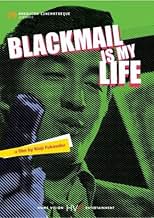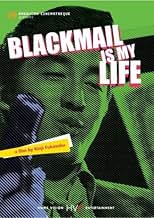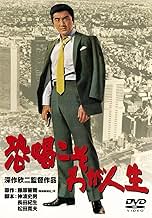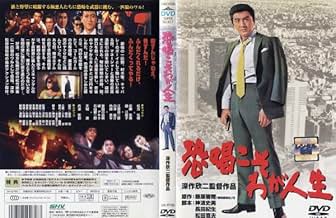Aggiungi una trama nella tua linguaA pungent, extremely entertaining tale of hedonistic, amoral blackmailer Matsukata.A pungent, extremely entertaining tale of hedonistic, amoral blackmailer Matsukata.A pungent, extremely entertaining tale of hedonistic, amoral blackmailer Matsukata.
- Regia
- Sceneggiatura
- Star
Recensioni in evidenza
Blackmail is my Life came in a transitional period for Japanese crime cinema and it shows that by being somehow stylistically confused. The genre was with one foot still set on the earlier Nikkatsu pictures that portrayed yakuzas as people who operated with some sense of chivalry (and BIML reflects that by having the blackmailers act as the heroes), the cool of Seijun Suzuki who bid the genre adieu with Branded to Kill one year earlier (and what an adieu that was) and one foot looking at the future.
The first half of the picture resembles the colourful pop air of Suzuki and anticipates the disjointed timelines and narrative style of The Yakuza Papers. Hiroki Matsukata is Muraki; professional blackmailer and quite successful at that. He lies on a bed and remembers. Flashbacks show us his humble beginnings. They start in black and white then colour kicks in. Frames freeze while he narrates in a voice-over. We go back and forth like that until after the half hour mark the story starts to shape up. His rise as a prominent blackmailer is seen through a series of incidents that lead up to the big con.
The second half is predicated more on character than style. Fukasaku puts the quirky flashbacks, stills and narration of the beginning to the side and focuses on the story in a straight-forward manner. He's just as good this way. The movie turns more cynical and gritty and the ending is particularly memorable.
The director is still not at the top of his craft (it's relatively still early in his career) but he shows that he's not willing to settle down for a simple, run-of-the-mill yakuza flick. He gambles; sometimes he wins, sometimes he doesn't. But he dares and as the saying goes, fortune favours the brave. If he hadn't taken a stab at a different approach like BIML, maybe The Yakuza Papers would have never materialized in all its glory. In that sense, Fukasaku deserves kudos for taking chances and following his vision.
Blackmail is my Life may not always be successful in its stylistic daring but it's entertaining and cool. As the missing link between the hard bop of the 60's and the grittiness of the 70's, it's an important part of the general picture. Fans owe it to themselves to check it out.
The first half of the picture resembles the colourful pop air of Suzuki and anticipates the disjointed timelines and narrative style of The Yakuza Papers. Hiroki Matsukata is Muraki; professional blackmailer and quite successful at that. He lies on a bed and remembers. Flashbacks show us his humble beginnings. They start in black and white then colour kicks in. Frames freeze while he narrates in a voice-over. We go back and forth like that until after the half hour mark the story starts to shape up. His rise as a prominent blackmailer is seen through a series of incidents that lead up to the big con.
The second half is predicated more on character than style. Fukasaku puts the quirky flashbacks, stills and narration of the beginning to the side and focuses on the story in a straight-forward manner. He's just as good this way. The movie turns more cynical and gritty and the ending is particularly memorable.
The director is still not at the top of his craft (it's relatively still early in his career) but he shows that he's not willing to settle down for a simple, run-of-the-mill yakuza flick. He gambles; sometimes he wins, sometimes he doesn't. But he dares and as the saying goes, fortune favours the brave. If he hadn't taken a stab at a different approach like BIML, maybe The Yakuza Papers would have never materialized in all its glory. In that sense, Fukasaku deserves kudos for taking chances and following his vision.
Blackmail is my Life may not always be successful in its stylistic daring but it's entertaining and cool. As the missing link between the hard bop of the 60's and the grittiness of the 70's, it's an important part of the general picture. Fans owe it to themselves to check it out.
The main character, Shun, characterized as a 'young punk' with his group of youthful, attractive social outcast friends, finds money in the business of blackmail in the underworld of an economically vibrant Japan. While riding high off a string of successful extortions of small time yakuza affiliates, their ill fated plot to steal a sensitive memorandum proves they have bitten off more than they can chew. I was initially impressed with the movie's style and pace and it seemed to be setting up a fun movie surrounding the exploits of this group of young bright eyed kids. I enjoyed how each character was given scenes that showcase them while Shun is still given the most back-story. That is all done in a pretty successfully stylized manner. But the main plot fails to really stimulate after the first 45 minutes of setup. I think the problem was that stealing a memorandum for money just wasn't as exciting as events that happened earlier in the movie and Fukasaku gets little heavy handed communicating themes in this later part of the movie, causing a few eye rolls on my part. A well shot movie- perhaps not the most realistic premise, and enjoyable, but not super thrilling.
A fun movie. Discovering films like this is a constant source of knowledge for me. Knowledge that cinema, today, creeps forward rather than bounds ahead, as we insist on believeing. Just when you think that some director's style is an innovation you realize it's either a rip-off of, or is derived from, a school that is older and off the beaten track. Rather than criticize old movies for "reminding" us of new movies, it's better to see these movies in a historical context. And then we might finally get over our big old selves and see modern cinema in a more accurate perspective.
I noticed that IMDb lists this as a crime film AND a comedy. Well, there's nothing funny about the film--it's not at all a comedy. Instead, the film is about four low-lifes who make a career out of blackmailing people and fighting various mobs (who SHOULD have been able to smash them like bugs but somehow didn't throughout much of the film). For them, it all seems to be for the thrills and laughs--the money is secondary. However, the deeper the risk the greater the thrills--so they keep biting off more and more and more. You figure that eventually they'll get in way over their heads. And that is when their friend Zero (a black guy--which is quite unusual for a Japanese film) is killed, things look really bad for these bizarre anti-heroes.
While this film is quite different from the usual mobster film of the time, it still is a pretty ordinary crime drama. It was reasonably entertaining but no more. For those who like the genre, it's worth seeing--for others, probably not.
While this film is quite different from the usual mobster film of the time, it still is a pretty ordinary crime drama. It was reasonably entertaining but no more. For those who like the genre, it's worth seeing--for others, probably not.
The story involves four people whose work is blackmail. They're successful in their "business," but their eyes eventually get too big for their stomachs when they think they've found a way to rip off the yakuza. The job proves harder than the easy money it initially seemed. While it is generally well done, its techniques reminded me a little too much of the annoying modern style with a lot of unnecessary freeze frames, chronological jumps, and shifts from black and white to color. I also felt that the characters ought to have been more well developed; the story is good, but the style overwhelms possible substance. My favorite part of the film is the fact that the characters whistle the theme tune to Suzuki Seijun's Tokyo Drifter, which means that Suzuki had to have had some popularity if his work was quoted like this. 7/10.
Lo sapevi?
- QuizTitle music, played several times during the film, is ripped off (different but substantially an imitation) from the 1966 Yardbirds' song "Over Under Sideways Down".
- ConnessioniReferences Tokyo Drifter (1966)
I più visti
Accedi per valutare e creare un elenco di titoli salvati per ottenere consigli personalizzati
Dettagli
- Paese di origine
- Lingua
- Celebre anche come
- Blackmail Is My Life
- Azienda produttrice
- Vedi altri crediti dell’azienda su IMDbPro
- Tempo di esecuzione1 ora 30 minuti
- Mix di suoni
- Proporzioni
- 2.35 : 1
Contribuisci a questa pagina
Suggerisci una modifica o aggiungi i contenuti mancanti

Divario superiore
By what name was Kyôkatsu koso waga jinsei (1968) officially released in Canada in English?
Rispondi





















